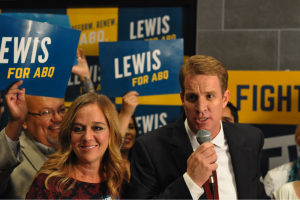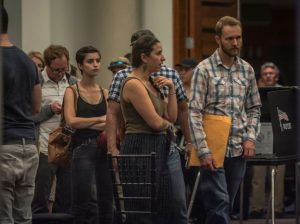Albuquerque voters will return to the polls on November 14th, to decide a forced runoff election between the two top vote-getters in the October 3rd mayoral election. The two finalists are NM State Auditor Timothy Keller and Albuquerque City Councilor Dan Lewis.
From the crowded ballot of eight candidates, Democrat Tim Keller won 39 percent of the votes; Republican Dan Lewis brought in 23 percent. A third-place finish went to former Democratic Party Chairman and local attorney Brian Colón, with 16 percent.

A runoff election is triggered if a candidate is unable to garner at least 50 percent of the votes in the general election.
Keller said he expected a run-off but was very pleased with his strong showing. “It is a testament to our vision. It’s a testament to everyone here tonight,” Keller told his supporters at an election night celebration.
The municipal election brought out more than 97,000 voters — a turnout of 29% of registered voters. The numbers are a bigger turnout than anticipated. The last Albuquerque election to draw that many voters was in 2001 when 99,340 city residents voted for mayor.
Voters had many reasons to go out and vote, but crime was clearly one prominent reason.
Crime statistics are up in Albuquerque. The FBI reported that Albuquerque saw violent crime increase by 15.5 percent and property crime rise by 13.3 percent from 2015 to 2016. Statewide, violent crime increased by 6.8 percent and property crime increased by 6.2 percent.
Crime was a prevalent topic in the many debates and town halls held by candidates. It was also a top theme in campaign ads.

Dan Lewis, according to his crime website, shows his focus is on keeping repeat offenders off the streets and placing more police on the streets to reduce the crime.
“Dan Lewis is the candidate I voted for in the election,” Albuquerque resident Mary Crenshaw said. Crenshaw, 40, calls herself a concerned mother who does not want her children to face these problems.
“His plan to stop crime in the city by keeping repeat offenders in jail and putting more police on the street really help show what change we need.”
Keller has a different approach to crime. He emphasizes crime prevention to cut down on violent crime in Albuquerque.
“Albuquerque needs and deserves a modern crime-fighting strategy that emphasizes violent crime prevention with a data-driven approach to focus on the most dangerous offenders in our community,” said Keller. “Not only can we have a huge impact on those currently committing crimes, but we can develop innovative strategies that help reduce crime across our community.”
“His plan to stop violent crime is very important because Albuquerque has been known for violent crimes and stopping this will help make the city a safer place,” said John Ortega, 23, a former University of New Mexico student.

With Keller and Colón bringing in more than 55 percent of the votes, it is apparent that Democratic voters showed up in force. Polls show Keller and Colón did not appeal to Republican voters.
Political observers explain it will be up to Keller and his supporters to sway the voters who sided with Colón. According to the NM Political Report, Colón explains he will be backing Keller in the runoff.
“We need a leader like Tim who will move past hateful rhetoric and focus on the things that bring us together and make us stronger,” Colón said.
Lonna Atkeson studies campaigns and elections as a political science professor at the University of New Mexico. She says historically the Albuquerque mayor’s race is not a party-driven process. But that’s changed.
“This election has changed from a race that is nonpartisan to now becoming a partisan race,” Atkeson says. “Many of the Democratic voters split the votes between Keller and Colón while the Republicans split the votes between Lewis and Johnson.”
Wayne Johnson was a Republican candidate in the mayoral race, who got 10% of the vote. Atkeson indicates that Johnson’s supporters will most likely back Lewis in the runoff election. ![]()
“If you voted for Johnson, it would make sense to vote for Lewis because you would get more from him compared to Keller.”
Another way the voters were pushed to go out and vote was the plentiful campaign advertising by the candidates. According to New Mexico In Depth, the candidates had a combined $2,646,494 put into the race to help get their message to the people. These numbers are much higher compared to previous mayoral races.
“The mobilization has been a huge factor in the voter turnout which was around 29%,” Atkeson said. “The parties put a lot of effort in advertisements and commercials to get people information.”